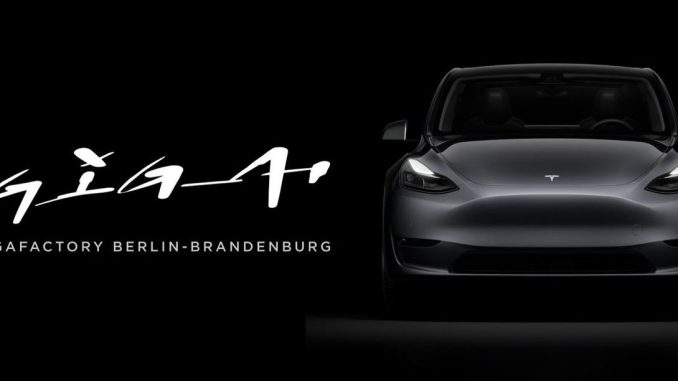Tesla officially handed over the first Model Ys as the German gigafactory began operations.

Key Highlights
- BERLIN, March 22 – Tesla has a 5 billion euro ($5.5 billion) plant in Gruenheide, Germany.
- will deliver the first Model Y vehicles to customers on Tuesday, establishing its first European manufacturing hub with the largest investment in a German auto factory in recent history.
- The German Chancellor, Olaf Scholz, will be there with Tesla CEO Elon Musk on Tuesday.
- "With plans to hire 12,000 people, the German gigafactory and the battery plant next to it will become the largest employer in the state of Brandenburg.
- At full capacity, it will create 500,000 cars per year—more than the 450,000 battery-electric vehicles sold globally by main rival Volkswagen (VOWG.DE) in 2021—and generate 50 gigawatt hours (GWh) of battery energy, far beyond the capacity of any other factory in the country.
Advertisement

BERLIN, March 22 – Tesla has a 5 billion euro ($5.5 billion) plant in Gruenheide, Germany. will deliver the first Model Y vehicles to customers on Tuesday, establishing its first European manufacturing hub with the largest investment in a German auto factory in recent history.
The German Chancellor, Olaf Scholz, will be there with Tesla CEO Elon Musk on Tuesday. This is a moment that Musk had hoped would happen eight months ago, but that has come a lot faster than expected for a project of this size, say local officials.
The announcement coincides with Musk's announcement of Tesla's Master Plan Part 3, which he says would detail the company's scaling to "extreme size."
With plans to hire 12,000 people, the German gigafactory and the battery plant next to it will become the largest employer in the state of Brandenburg.
At full capacity, it will create 500,000 cars per year—more than the 450,000 battery-electric vehicles sold globally by main rival Volkswagen (VOWG.DE) in 2021—and generate 50 gigawatt hours (GWh) of battery energy, far beyond the capacity of any other factory in the country.
Volkswagen now dominates Europe's electric car market, with a 25% market share versus Tesla's 13%. Musk has warned that ramping up production will take longer than the plant's two-year construction period. Continue reading
According to JPMorgan, Gruenheide will make about 54,000 cars in 2022, then 280,000 cars in 2023, and 500,000 cars in 2025.
Advertisement

Volkswagen Battery Facility
Volkswagen, which has already received orders for 95,000 battery electric vehicles in Europe this year, is planning a new two-billion euro EV facility in addition to its Wolfsburg production and six battery plants throughout Europe.
However, its timescale is behind Tesla's, with the EV factory scheduled to begin in 2026 and the first battery facility scheduled to open in 2023.
Tesla gained final approval from local authorities to commence manufacturing on March 4, subject to the company meeting numerous restrictions regarding water consumption and air pollution control.
Tesla came perilously close to losing its water supply contract when local environmental groups filed a protest against the environmental ministry, objecting to the licence issued to Tesla's water supplier.
Finally, the court decided that the ministry could go ahead with water extraction if it held a new public meeting.
Environmental groups have the right to appeal the verdict. Citizen groups have said that even if they don't, they plan to fight Tesla's plan to expand, citing things like light pollution and water contamination.
Advertisement